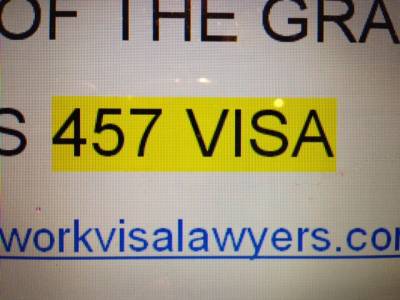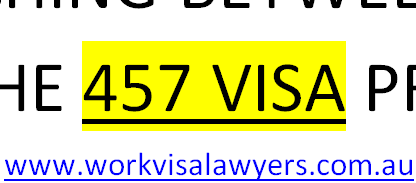In an earlier blog published in June this year, it was mentioned that the Department of Immigration and Border Protection (DIBP) has been getting tougher in relation to the processing of visa applications and monitoring of granted visas. Six months later the trend seems to be continuing where the DIBP is looking to tighten policies surrounding the Australian visa programme.
Changes to the Occupation Lists – Skilled Occupation List (SOL), Consolidated Skilled Occupation List (CSOL), Regional Sponsored Migration Scheme (RSMS) Occupation List, 457 visa occupation list
There has been recent talk about possible changes to the Skilled Occupation List (SOL) with a suggestion that 52 occupations will be removed. The occupations reportedly under scrutiny include:
- Production Manager (Mining)
- Accountant (General)
- Management Accountant
- Taxation Accountant
- Actuary
- Land Economist
- Valuer
- Ship’s Engineer
- Ship’s Master
- Ship’s Officer
- Surveyor
- Cartographer
- Other Spatial Scientist
- Chemical Engineer
- Civil Engineer
- Geotechnical Engineer
- Quantity Surveyor
- Structural Engineer
- Transport Engineer
- Electronics Engineer
- Industrial Engineer
- Mechanical Engineer
- Production or Plant Engineer
- Aeronautical Engineer
- Agricultural Engineer
- Biomedical Engineer
- Engineering Technologist
- Environmental Engineer
- Naval Architect
- Medical Laboratory Scientist
- Veterinarian
- Medical Diagnostic Radiographer
- Medical Radiation Therapist
- Occupational Therapist
- Podiatrist
- Speech Pathologist
- General Practitioner
- Anaesthetist
- Cardiologist
- Endocrinologist
- Gastroenterologist
- Intensive Care Specialist
- Paediatrician
- Obstetrician and Gynaecologist
- Medical Practitioners (nec)
- Barrister
- Solicitor
- Psychotherapist
- Psychologists (nec)
- Chef
- Boat Builder and Repairer
- Shipwright
Source: SBS
While these occupations are flagged for removal there is no certainty that they will be removed. However with the current trend of tightening the door on migration to Australia, prospective visa applicants are urged to submit an application as soon as possible to avoid any negative impact policy changes.
What does it mean if my occupation is removed from the SOL?
When your occupation is removed from the SOL it means that you will be unable to apply under the Skilled Independent subclass 189 visa or the Skilled Regional Sponsored (Relative) subclass 489 pathways. Instead you will need to apply via the Skilled Nominated subclass 190 or the Skilled Regional Sponsored (State/Territory) subclass 489 visa pathways. This is assuming that your occupation is on the CSOL and relevant Australian state/territory occupation lists.
What about the CSOL and RSMS occupation lists?
DIBP may also make changes to the CSOL and RSMS occupation list. However it may not come as a surprise if changes are made, especially since the DIBP has been adopting a closing-the-door mentality to the migration programme.
Changes to the 457 visa occupation list
The Minister for Immigration Peter Dutton recently spoke to the media and mentioned that the 457 visa occupation list will be “condensed”, signalling a potential shortening of the list and removal of some occupations. Although the occupations to be removed have not been specified, occupations which have been monitored heavily by the DIBP such as Café and Restaurant Manager, Chef, etc. may be likely to be removed from the 457 occupation list. Read our previous blog on the topic here.

Leaked discussion papers indicate a possibility of universal two-stage visas for migrants to Australia
On 30 November 2016 media reported a leaked Cabinet document which discusses the probability of a universal two-stage visa process for all migrants looking to migrate to Australia. This means that all migrants will have to undergo a provisional visa stage before being granted a permanent visa.
While it is stated that the cause for such a change is to ensure migrants are able to assimilate and adapt to the Australian way of life, the Department of Social Services have indicated a fear of creating social divisions between Australians and migrants.
Comments by Chris Johnston – Principal Lawyer and Registered Migration Agent at Work Visa Lawyers
There are currently a large number of visas where applicants obtain permanent residency immediately upon visa grant. These visas include the subclass 189 Skilled Independent visa, the subclass 190 Skilled Nominated Visa, the subclass 187 RSMS visa, the subclass 186 Employer Nomination Scheme (ENS) visa, the subclass 143 Contributory Parent visa, the subclass 858 and subclass 124 Distinguished Talent visa and the subclass 132 Business Talent visa. The proposed changes will enforce a provisional visa stage for the visa applicants above. This means a delay in Medicare eligibility, and possibly the need to pay international student fees for school-age children. Essentially the attractiveness of the visas is reduced.
From a migration perspective this means that migrants may be facing checks at three separate stages. Migrants will be assessed at:
- the initial visa application stage
- the provisional visa to permanent visa application stage
- the permanent visa to citizen stage
During the application stages above it provides the DIBP an opportunity to conduct checks on a migrant and their suitability for further stay in Australia. With the increasing emphasis of s501 – Character and PIC 4020 – Bogus and Misleading Information, migrants will need to be very careful to ensure all documents and information submitted to the DIBP are accurate and genuine.
Section 501 of the Migration Act 1958 – Visa cancellation powers
Section 501 part (3A) of the Migration Act allows the Minister of Immigration to cancel provisional and permanent visas when a visa holder fails the “character test”. This would apply to provisional and permanent visa holders who:
- are charged with a sexual offence involving a child;
- have a substantial criminal record, which includes:
- receiving a death sentence
- receiving a sentence of life imprisonment
- sentenced to a term of imprisonment of 12 months or more (can be cumulative)
- plead of insanity and detainment in a facility or institution
- not being fit to plead, but found guilty of an offence and detailed in a facility or institution
The application of such powers was evidently demonstrated when convicted bikies and other charged criminal offenders had their visas cancelled and were forced to leave Australia.
It is expected that the DIBP will continue to utilise this cancellation power to remove visa holders who are of negative influence or character. The DIBP will be checking on visa holders at the visa and citizenship application stages, as mentioned in the earlier paragraph.
Sources:
http://www.austlii.edu.au/au/legis/cth/consol_act/ma1958118/s501.html
Comments by Chris Johnston – Principal Lawyer and Registered Migration Agent at Work Visa Lawyers
The trend in policy changes from the DIBP is that the doors are closing. There have been knee-jerk reactions to the 457 visa abuse reported earlier in the year and thus the DIBP is taking a tough stance to all visa applications and compliance with visa and sponsorship obligations. In fact Australia was recently mentioned in a travel article to be one of the toughest customs and immigration authorities in the world.
The current DIBP mentality also means that visa applicants and sponsors should not think that they are safe from scrutiny once a visa application is complete. There have been increasing reports of compliance monitoring for sponsored work visas, especially in the hospitality industry. Provisional and permanent visa holders are also subject to monitoring as mentioned in the section 501 write-up above.
These policy discussions and changes indicate a “closing-the-door” trend and are in stark contrast to Canada, a country similar to Australia in terms of geography (large land mass but concentrated population in a few areas) and economy. Just yesterday the Canadian government announced a new Global Skills Strategy programme which will target highly skilled migrants and encourage them to move to Canada. If Australia continues to tighten its migration policies, we will be losing out in terms of attracting skilled and highly qualified professionals from overseas, which will help in boosting the Australian economy, innovation and cushion the effect of our aging population.
This information is accurate on 2 December 2016
Do you need help with an Australian visa application?
At Work Visa Lawyers we are experienced in assisting applicants in all matters relating to Australian visa applications. Our areas of expertise include Skilled Migration visas, Business Skills Migration visas, Employer Sponsored Work Visas, Partner and other Family Migration visas as well as the Administrative Appeals Tribunal (AAT) Review, Judicial Review and Ministerial Intervention.
If you require further information regarding your Australia visa options you can contact us through:
(08) 8351 9956 or +61 8 8351 9956
or This email address is being protected from spambots. You need JavaScript enabled to view it.








